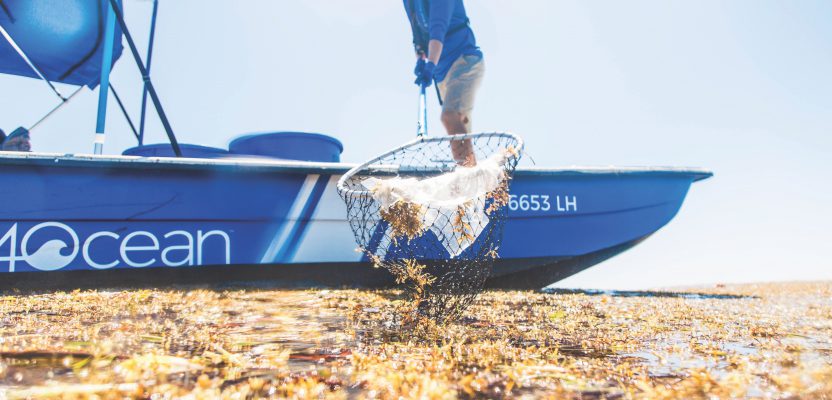4Ocean uses geospatial technology to clean oceans, helping to reduce and reimagine plastic waste.
The mess is big enough that it can be seen from outer space. These days, satellite imagery reveals massive islands of plastic in oceans, and the waste is so vast that various groups and inventors are trying to combat the problem through creative means.
One such company, a relative newcomer to the pack, came about as a concept four years ago from two young men on an adventure.
4Ocean, a Florida-based for-profit firm, captures and recycles plastic into wearable bracelets. The company began as an idea one day in the summer of 2015, when surfers Andrew Cooper and Alex Schulze were on a surf trip to Bali, Indonesia and visited a small fishing village to surf.
Searching for the big waves, the thrill-seeking duo found a big waste—beaches ruined by blankets of garbage and seas clogged with junk. Undeterred, they paddled through piles of floating trash and past fisherman navigating through the skim of junk.
The surfers wondered if the fishermen could use their nets to catch plastic. And they worried about the harm being caused to the environment due to the plastic waste—fish killed, waters polluted, beaches made disgusting.
The devastated feeling the men had when they saw the trash lingered in their hearts long after they left Bali. When they resolved to do something about the problem, they formed 4Ocean in 2017.
4Ocean’s ecological efforts, performed globally by cleanup crews, are funded through the sale of its wearable bracelets made of recycled plastic. Every bracelet a consumer buys from the company helps the company remove a pound of trash from the ocean, according to 4Ocean.
These days, Bali and Haiti are two of the locales where the company’s operations are cleaning up the sea and seashore. Other areas have been targeted for cleanups, too.
Since its start, the company has removed more than 5,000,000 pounds of trash from oceans and coastlines. It employs more than 300 workers and has engaged in 15 partnerships with conservation organizations.
Business is picking up, possibly due to the firm’s model that appeals to socially minded consumers. The bracelets are a tangible reminder, a call to action of sorts, and a way to change consumption behaviors.
“When you have the opportunity to grab plasticware or a plastic straw, you look at your wrist as reminder and say, ‘This time I’m going to refuse, reduce, reuse, and then recycle,’” 4Ocean co-founder Cooper says.
Benefits of For-profit
The company’s purpose is twofold: to spread awareness of the problem of ocean plastic and to help remove and recycle such garbage from the world’s seas.
“As a for-profit business, we’re able to give ocean trash a monetary value and to incentivize people all over the world to change their behavior,” Cooper says. “That’s how we clean the ocean and drive the actions and policies that will prevent trash from entering it in the first place.”
Catching fish isn’t the only thing fishermen can profitably do in the ocean, thanks to the company’s efforts. By using geospatial technology such as GPS on boats to locate and remove mounds of plastic, 4Ocean is making junk profitable for some people.
“We’re creating new, more sustainable economies around the world by paying fisherman to collect plastic and trash from the ocean instead of fish. It’s changing the way people think about the problem of plastic pollution,” explains company co-founder Schulze.
Creating Awareness
The ecological message of 4Ocean is to change behaviors when needed, forego convenience or other factors if necessary, and use less plastic and recycle what you use.
“Single-use plastic is used because it’s convenient, and a lot of times people can only afford convenience. It’s all a part of a bigger picture,” Cooper says. “In the next 20, 50, to 100 years, putting the cleanup side out of business because we removed all the plastic out of the ocean would be a great milestone to reach, but there’s still so much work to be done on land that I think we’ll be here for a long time.”
It’s possible that spreading awareness of the harms of not recycling plastic, by way of 4Ocean’s messaging and products, could do as much or more to clean the oceans of plastic waste than the company-sponsored cleanup efforts.
“An increased awareness of the problem and its impact encourages individuals, communities, businesses, and governments to change the way they think about and consume plastic. When hundreds and thousands and millions of people take small actions to prevent plastic from entering the ocean, we can have a massive impact on its future,” Cooper says.
The co-founders are not daunted by the gargantuan task they’ve undertaken. They believe they can surmount it.
“Our goal is to become the largest ocean cleanup company in the world,” Schulze says. “We have already identified other high-impact areas and expect to open additional cleanup headquarters that pull plastic and trash in areas where it will make the greatest difference for the ocean and the communities who rely on it to survive.”

